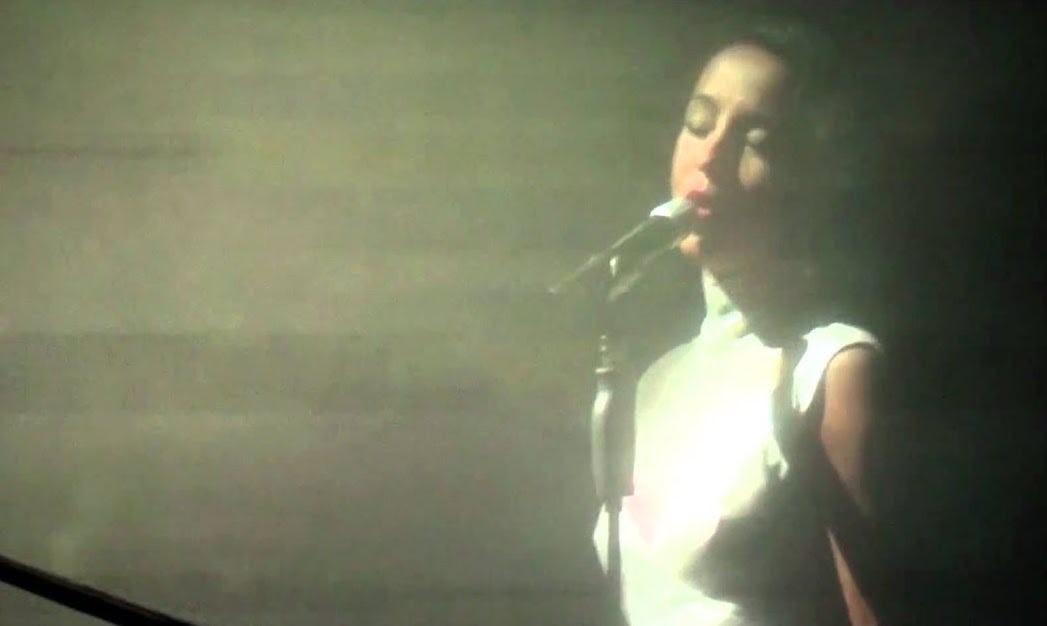Spectacular Brooding
On Sade's "Morning Bird" and the importance of being haunted.
The Hidden/Haunted Muse
Haunts are addictive, and ghosts are, even concealed traumas are; they’re secrets without the hint of pettiness that can make regular secrets feel flimsy or phony—our haunts grant us a private impervious universe wherein we can dazzle and reel. Haunts are the universal muses. We pretend we want to outrun them as a way of protecting them. Those of us with unconventional senses of entitlement feel entitled to our haunts as if we willed them and nurtured them into the private network of complexes and affinities that they become; we covet the way they open us to a life of innuendo and double speak and self-seduction. Today’s world is haunted, addictive and addiction driven, hauntological, prey to unanswerable calls, a bottomless let down teaching us to fly and ride it, or watch the world die pretending that endless spectatorship is getting over, which is to say, watch the world die of pride. Haunted music responds to these conditions with shameless soul-bearing that would almost make us uncomfortable if we weren’t so busy joining, taking that risk with the music.
Sade’s “Morning Bird” is one of the most haunted pieces of music there is, a ballad with so much space throughout that it risks collapsing into itself and acquiring a kitsch intensity, but instead it uses that sunken space for reflection, avoiding disillusion and refusing to perform revelation like so many haunted and possessed songs do. “Morning Bird” proclaims, echoing the Abbey Lincoln line from her song “Retribution,”— I ain’t disillusioned— but goes on to tease disillusionment as if it’s an inheritance that strengthens, suits us, gives us our deepest appeal. The haunted are the most seductive among us because they lure, not just with themselves but with the allure of the hidden ones within them, double animating their consciousness. Embodying this, Sade opens “Morning…” her version of a prayer call with the unbecoming accusatory: how could you, following tepid piano and a heave of marching drums— like a slow-motion Mardis-Gras scene halting somewhere in purgatory, then dancing in its own unexplained blood bath you were the blood of me, the harvest of my dreams she continues. And it would be easy to hear these lines and leap to believing that this is another eternally sultry break-up anthem from her catalog of smoldering break-up anthems— but what we’re hearing is requiem, a woman leaving the comfort of her haunts and tropes to accuse them of theft. The blame she casts is recursive, the singer has somewhere to be and her heart is too crowded to enter that new place in the company of her phantoms, so she sings for we who are the only survivors of our personal horrors, who leave them behind alone. A slight sense of resentment for being spared colors this morning bird an azure red of blues blood coming out to show them.
Noon Night
When “Morning Bird” was released as one of the first singles on her Soldier of Love album in winter of 2010, I was visiting LA from New York as I did often around that time, and I spent nights driving around desolate 2AM Los Angeles with a friend, immersed in Sade’s brand new requiem for conditional love. And I was newly in love, naively, and haunted and all of my pent up allure jiving with an agony addiction I was just coming to terms with. We drove to the pulse of that reckoning the night it premiered on late-night radio, breathless until the song’s final talon reached in and grabbed us by the throat in our hearts the ghost of my joy, won’t let me be, Sade muttered, like an aside so it would cut a little deeper, like a new way to say the dead make me happy, does that mean I’m sad? Am I always a little interrupted by what I see on the other side of time, the line wonders, declares. What I love about the transcendent almost nurturing pain Sade conjures in this haunted bliss-song, is that when you come out on the other side of its sound, with its inescapable demands on the spirit, you come out poised for a laugh riot, almost delirious. A register this intense cannot be maintained or withheld, its sonic apparition making the ghosts known before they go back to being clandestine, glimmering emanations. Anticipating that recovery of self and embodied soul, the song’s thesis shows up in its final lines, which beg to remain at the mercy of its sweet demons if you set me free I will not run she trails off repeating I will not run away, I will not run, the drums slurring but sharpening her declaration.
Anything that’s been worth my time long term has evoked this paradox in me, equal parts rebellion and surrender, a freedom through deep commitment and the sense/illusion of certainty that committing offers. The free spirited midnight girl archetype I discovered through my father in his song by that name risks undermining itself with the morning bird archetype Sade seduces us with here— someone who plays the victim rather than owning her nature and power, who wills her desolation by denying her need for freedom. But Sade slips out of her own trap, and allowed me to with her. Her version of dawning gave me permission to sulk without choosing one archetype or the other, without accusing myself of self-sabotage for having feelings. She stood up for the value of tattered, no-frills black love and the accompanying black melancholy, equally unadorned, tonally therapeutic because so many of our feelings are expected to be decorative and spectacular that when they come out raw and almost dragging behind sputtering parade drums, we’re quick to deem that inadequate and narrow our own range to accommodate some sense that everything we express has to be harrowing to be worthy of sharing. What if we just wanna do some understated swaying and muttering in the dark, we can do that beautifully too, we can be as haunted as we are and the ones doing the haunting.
Subvocals
Sade accesses a glorious, sensual, unintelligibility with “Morning Bird,” like the eariliness or aheadness the song’s title suggests, a rolling over in bed to whisper something to your lover feeling. We’re not allowed into the details of this drama, we visit its outskirts and aftermath, a killing floor blues, a here I come to save myself blues, a run up on freedom chant distracted by its own sensible scheme— the desire to be possessed by liberation, the desire to be captive but for that captivity to engender the promise of eternal escape, the ability to be as inspired by what is withheld as by what is promised in love.
Requiem, dream song, escapist’s anthem, healing balm of a tonally enjambed dramaless romance with the unspeakable—Sade’s “Morning Bird” scooped me off a personal stupor the first night I heard it and then again and again, by reminding me that the haunts I kept pretending I wanted to escape were my muses, my favorite things, and I theirs, that we invent lighthearted escape fantasies for the things we are afraid of but know we must learn to live with, and confuse those with the things we must outrun and overcome for survival. I’d spent so much time positioning myself as resilient before encountering this song’s permission to be more than that, that some of my moments of vulnerability had turned into performance. Sade’s mourning tone reminded me of my authentic vulnerability, beyond any affectation, beyond any confusion of vulnerability with victimhood or weakness. “Morning Bird” is terrifying, like that photo of a hawk flying over a beach with a shark in its claws, or like any photograph of yourself alone in the mirror averting your own gaze. Its torch slips into Roy Hargrove’s palm in this immeasurable equation of black psalm, reminding us that his song title “Joy is Sorrow Unmasked” predicts the outcome of the black melancholy Sade unmasks. Suddenly the ghost of my joy was allowed to just be the joy of my joy, the blood of me, who sang me into life, as the song names it, and it was not a lamenting thing, and I could hear Nancy Wilson’s iconic stutter of mercy and you don’t and you don’t and you don’t know… how glad I am and Stevie Wonder’s edgy lilt the joy inside my tears. Sade, hierophant, will show up haunted and haunting to clear any staticy intentions, and reluctantly or not, naively or not, secret ego giving up its ghost or not— love becoming realer and more difficult and more urgent under the glow her blunt tonal guidance, you will oblige.



